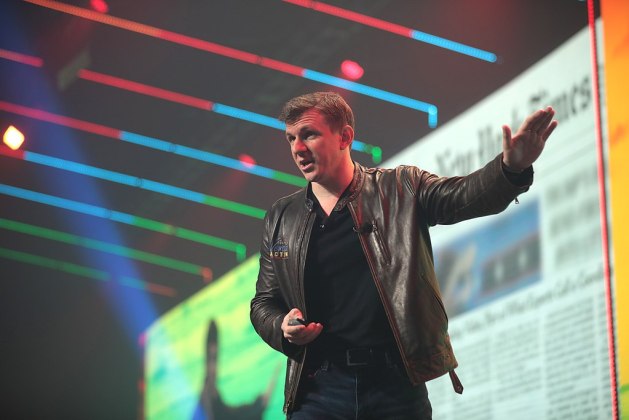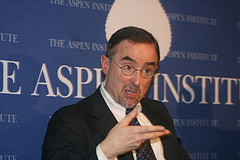
James O’Keefe of Project Veritas. Photo (cc) 2020 by Gage Skidmore.
A pair of legal battles involving Project Veritas, a right-wing activist group known for recording its victims on hidden camera and then deceptively editing what they said, have raised a couple of dicey First Amendment issues.
The first involves FBI raids against James O’Keefe, the founder of Project Veritas, as well as against his associates. The raids were connected to the alleged theft of a diary kept by President Biden’s daughter Ashley, even though Veritas did not publish anything from the diary and ended up turning it over to law enforcement.
Become a member of Media Nation for just $5 a month! Members receive a weekly newsletter with exclusive early content. Just click here.
As Josh Gerstein writes in Politico, the raids “are prompting alarm from some First Amendment advocates, who contend that prosecutors appear to have run roughshod over Justice Department media policies and a federal law protecting journalists.” He quotes longtime First Amendment advocate Jane Kirtley, a former executive director of the Reporters Committee for Freedom of the Press, as saying:
This is just beyond belief. I’m not a big fan of Project Veritas, but this is just over the top. I hope they get a serious reprimand from the court because I think this is just wrong.
Maybe, maybe not. Project Veritas is entitled to the protections afforded to any journalistic organization, no matter how sleazy. The question, as Gerstein observes, is whether Veritas did anything illegal in obtaining the diary.
For instance, Daniel Ellsberg, Chelsea Manning and Edward Snowden all broke the law in obtaining secret documents, and they all paid a high price for their actions. The news organizations that published those documents, though, were not prosecuted because there was no evidence they had participated in those crimes. (Julian Assange of Wikileaks is a special case. Source or publisher? Passive recipient or active participant in the theft of classified information? I’ll leave those questions aside for today.)
What we don’t know about the Project Veritas case is whether the government is claiming that O’Keefe and his crew were participants in the theft of the diary. If that’s what they’re charged with, then the First Amendment doesn’t come into play — and I suspect that’s what we’re going to find out. Absent such a claim, though, the actions of the FBI would indeed represent a grave threat to freedom of the press.
The second, and more serious, case involves a libel suit that Project Veritas filed against The New York Times. In a proceeding not directly related to the libel claim, Veritas argued that documents the Times published violated the group’s right to attorney-client privilege. That led to an extraordinary order, reported by Michael D. Grynbaum in the Times:
On Thursday, the trial court judge, Charles D. Wood of State Supreme Court in Westchester County, ordered that The Times “immediately sequester, protect and refrain” from disseminating any of the materials prepared by the Project Veritas lawyer. Furthermore, Justice Wood instructed The Times to “cease further efforts to solicit or acquire” those materials, effectively preventing the newspaper from reporting on the matter.
This is censorship — prior restraint. I’m sure Judge Wood has a law degree, but anyone who’s taken an undergraduate First Amendment course knows this is unconstitutional. Under the Near v. Minnesota standard, the government may not engage in prior restraint except in a few narrowly drawn instances: incitement to violence, serious breaches of national security and obscenity. By contrast, the reasons for restraining the Times in the Project Veritas case are trivial. Bruce Brown, executive director of the Reporters Committee for Freedom of the Press, put it this way:
This is the first prior restraint entered against the New York Times since the Pentagon Papers, and it is an outrageous affront to the First Amendment.
Prior restraints — which are orders not to publish — are among the most serious threats to press freedom. The trial court should have never entered this order. If it doesn’t immediately vacate the prior restraint, an appellate court must step in and do so.
Two cases, two very different sets of facts. As I said, we’ll have to wait and see on the first case, which might prove to be no big deal. The second case, though, strikes me as a reflection of the low esteem in which the media are held these days. A protection that has allowed news organizations to publish secret government documents as long as they don’t put the country at risk is now being flouted by a state judge for the flimsiest of reasons.




